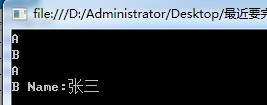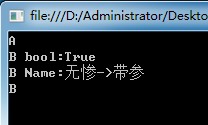首先说明下 之所以用 双引号 是因为构造函数是没有继承的
派生类默认会调用基类的无参数构造函数
比如:
public class A {
public A() {
Console.WriteLine("A");
}
public A(string name) {
Console.WriteLine("A Name:{0}", name);
}
}
public class B : A {
public B() {
Console.WriteLine("B");
}
public B(string name) {
Console.WriteLine("B Name:{0}", name);
}
}
class Program
{
static void Main(string[] args)
{
B b = new B();
B b1 = new B("张三");
Console.ReadKey();
}
}
输出的结果为:

说明不管调用派生类的哪个构造函数,默认都先调用基类的无参数构造函数
之所以标题中用 "继承" 是因为构造函数之间的调用也是用 ":",下面就在派生类里面调用一下基类的构造函数
class Program {
static void Main(string[] args)
{
B b = new B();
Console.ReadKey();
}
}
public class B : A {
public B():base("B->A") {
Console.WriteLine("B");
}
public B(string name) {
Console.WriteLine("B Name:{0}", name);
}
}
输出结构为:

由结果可以看出,当给B的构造函数手动指派要调用的基类带参数的构造函数后,将不再执行基类的无参数构造函数
下面写下在同一个类中构造函数的调用
class Program {
static void Main(string[] args)
{
B b = new B();
Console.ReadKey();
}
}
public class B : A {
public B():this("无惨->带参") {
Console.WriteLine("B");
}
public B(string name):this(true) {
Console.WriteLine("B Name:{0}", name);
}
public B(bool b) {
Console.WriteLine("B bool:{0}", b); }
}
输出结果:

为了看一下调用的先后关系就又加了一个bool参数的构造函数,由结果可以看出如果构造函数调用了另一个构造函数,例如:
public B():this("无惨->带参")
执行顺序是从后向前依次执行的